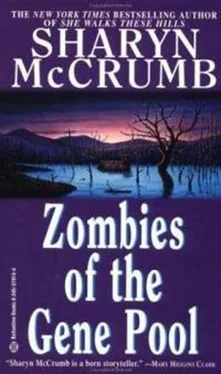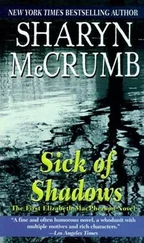Sharyn McCrumb - Zombies of the Gene Pool
Здесь есть возможность читать онлайн «Sharyn McCrumb - Zombies of the Gene Pool» весь текст электронной книги совершенно бесплатно (целиком полную версию без сокращений). В некоторых случаях можно слушать аудио, скачать через торрент в формате fb2 и присутствует краткое содержание. Жанр: Детектив, на английском языке. Описание произведения, (предисловие) а так же отзывы посетителей доступны на портале библиотеки ЛибКат.
- Название:Zombies of the Gene Pool
- Автор:
- Жанр:
- Год:неизвестен
- ISBN:нет данных
- Рейтинг книги:3 / 5. Голосов: 1
-
Избранное:Добавить в избранное
- Отзывы:
-
Ваша оценка:
- 60
- 1
- 2
- 3
- 4
- 5
Zombies of the Gene Pool: краткое содержание, описание и аннотация
Предлагаем к чтению аннотацию, описание, краткое содержание или предисловие (зависит от того, что написал сам автор книги «Zombies of the Gene Pool»). Если вы не нашли необходимую информацию о книге — напишите в комментариях, мы постараемся отыскать её.
Zombies of the Gene Pool — читать онлайн бесплатно полную книгу (весь текст) целиком
Ниже представлен текст книги, разбитый по страницам. Система сохранения места последней прочитанной страницы, позволяет с удобством читать онлайн бесплатно книгу «Zombies of the Gene Pool», без необходимости каждый раз заново искать на чём Вы остановились. Поставьте закладку, и сможете в любой момент перейти на страницу, на которой закончили чтение.
Интервал:
Закладка:
"Well, Marion, he's had thirty years to get used to the idea."
She shuddered. "I don't think that would be long enough for me."
"Here's our room, 208." Jay fumbled for the key. "Are we meeting Erik back downstairs?"
"Yes. I told him ten minutes."
The key clicked in the lock, and he pushed open the door, signaling for Marion to enter first. She glanced at the quilted twin beds, the framed silkscreen prints of mountain scenes, and the little round table placed under a swag lamp. "It looks okay," she conceded. "Nouveau rustic motel."
At the far end of the room the floor-length curtains were drawn to keep out the evening sun. Marion pushed back the curtains and called out to Jay Omega, "Oh, goody! A view of the lake."
When they returned to the lobby ten minutes later, Erik Giles was sitting on one of the earth-tone sofas, leafing through a travel brochure on Ruby Falls. "In my day the big attraction was Rock City," he remarked. "Half the barns in the region had 'See Rock City' printed on the roof in white letters. I never did, though. Wonder if it's still in business."
Marion frowned. "I think that's down near Chattanooga. This part of east Tennessee seems fairly devoid of tourist traps."
Giles grinned. "Don't tell Bunzie. He might try to turn this into a permanent exhibit."
"Is he here yet?" asked Marion, trying not to sound starstruck.
"No. He must be on his way, though. There was an invitation to a cocktail party for the Lanthanides in the Franklin Suite at nine tonight, so apparently we're all getting together to socialize before the media gets here to cramp our style." He looked up at Jay Omega. "Speaking of the Lanthanides, I'm afraid that I must ask a favor of you. There was another message here, too. It was addressed to 'Whichever of the Lanthanides Arrives First.' "
"Interesting," said Jay Omega. "A door prize?"
"Alas, no. It's from George Woodard. He's stranded at the State Welcome Center with car trouble. He wants us to go and get him."
The invisible woman was enjoying her plane ride. At least she was registering ironic amusement at the fact that no one seemed to notice her or cared to speak with her. She was not enjoying the trip in the sense that she was actually happy; she did not particularly care for plane rides. But it was pleasant to be going on an unexpected vacation, and at the moment it was entertaining to contemplate the lengths to which this invisibility might extend. Could she get up and dance naked in the aisles? Could she sing at the top of her lungs? No, but she could certainly observe her fellow passengers without fear of return scrutiny. She was the closest thing there is to nonexistent: an overweight, middle-aged woman.
Perhaps, thought Angela Arbroath, such women were like General MacArthur's old soldiers: they didn't die, they just faded away. Angela, who had never been a beauty in the first place, had been fading away for twenty years now, and she thought she must have achieved the ultimate in nonentity. Now when she walked down the street, people pushed past her with their eyes staring straight ahead as if she were merely a pocket of dead air.
A different sort of woman might have been offended at this universal slighting of her humanity, but Angela Arbroath, who considered herself quite charming and not particularly human, thought it was a wonderful cover. It was like having a secret identity. Let people ignore me, she would tell herself; that way they will never know what they missed. It was odd that people assumed that quiet, unglamorous people were also meek and unintelligent. She was neither, but she didn't see any point in letting the whole world in on the secret. Her friends knew what a special person she was, and that was enough.
Thirty years ago she might have minded being universally overlooked. But back then she still cared what strangers thought of her; she still had feelings to be hurt. Now she had adjusted very nicely to a world of her own making, which centered around her century-old cottage in Clemmons, Mississippi, and her garden of medieval medicinal herbs. And of course, her mailbox. Angela had assembled a carefully chosen family of cats, entertaining correspondents, fantasy and medieval history books, and a few eccentric old friends, and that was her world. The Soul selects her own Society-Then-shuts the Door. She had that line from Emily Dickinson done in calligraphy and framed. It rested on the mantel above the stone fireplace. On winter evenings Angela would sit on her red velvet settee beside the fireplace, with cats curled up all about her, and she would answer letters to people without really wishing they were there.
She leaned back in her seat and smiled with contentment at her lot in life. Pat Malone would have been proud of her-insofar as he would have given a damn, she amended hastily. Poor old Pat. He was the only one of the Lanthanides that she would really like to see, and he was dead. A pity-she wondered what he would have thought of the mature and mellow Angela, the one who would rather bake zucchini bread than argue.
"About damn time," she pictured him saying. "Arguing is a waste of time. You cannot convert a fan; you can only enrage him."
But Pat might have minded that she had let herself go a bit. There was no getting past it: men were shallow. Even clever and unconventional ones like Pat Malone would probably prefer the sloe-eyed gamine of yesteryear to her present grandmotherly self, but even that didn't trouble her much. She still wore her hair long and straight, because it was the least troublesome thing to do with it, and her wardrobe ran to comfortable shifts, oversized jackets, and flat shoes, because fashion did not concern her either. For festive occasions she had homemade and hand-embroidered dresses in a medieval style, because it pleased her to wear them. Angela had come to terms with who she was, and had there been a psychiatrist in Clemmons, Mississippi, he would have pronounced her well adjusted.
Angela was still in high school when she began writing to the Lanthanides. One of them had written a comment in one of the fanzines she subscribed to, and he mentioned the Fan Farm. Their Tennessee address had reassured her somehow that these were nice boys. You never knew with the ones from New York or Minneapolis. Her mother had drummed it into her head that Yankees couldn't be trusted, that they weren't the right sort of people. After all, look what they did to Vicksburg. By the time she discovered the northern origins of most of the Lanthanides, they were solidly entrenched as her friends and confidantes, and she had become a fan publisher with her very own 'zine, reaching out to Yankees and other alien beings from coast to coast. She used the church's mimeograph machine, paying for her ink and paper supplies with money she earned on a paper route. The response was astonishing. For the first time in her life, Angela found herself popular.
She hadn't intended to be a self-published magazine editor. At first she merely wanted to correspond with the people she met through other people's 'zines, but a few samples of these grainy, amateurish efforts convinced her that she could produce a better one, and she quickly realized that it was much simpler to produce one magazine than it was to try to write twenty-five personal letters.
So Archangel had been born. Either by luck or uncommon good sense (she refused to remember which), Angela had written to Brendan Surn and Pat Malone and a couple of the fan-elite of the day, asking them to contribute articles to her first edition. And because most of them would have given an article to anyone who asked them nicely, they responded by sending her amusing and informative columns that she dutifully typed in on her father's old Underwood typewriter. When the issue was complete, she sent it to a few of the People Who Mattered in fandom, and suddenly she was a celebrity. People clamored for subscriptions to Archangel, and overnight she had a hundred new friends.
Читать дальшеИнтервал:
Закладка:
Похожие книги на «Zombies of the Gene Pool»
Представляем Вашему вниманию похожие книги на «Zombies of the Gene Pool» списком для выбора. Мы отобрали схожую по названию и смыслу литературу в надежде предоставить читателям больше вариантов отыскать новые, интересные, ещё непрочитанные произведения.
Обсуждение, отзывы о книге «Zombies of the Gene Pool» и просто собственные мнения читателей. Оставьте ваши комментарии, напишите, что Вы думаете о произведении, его смысле или главных героях. Укажите что конкретно понравилось, а что нет, и почему Вы так считаете.












